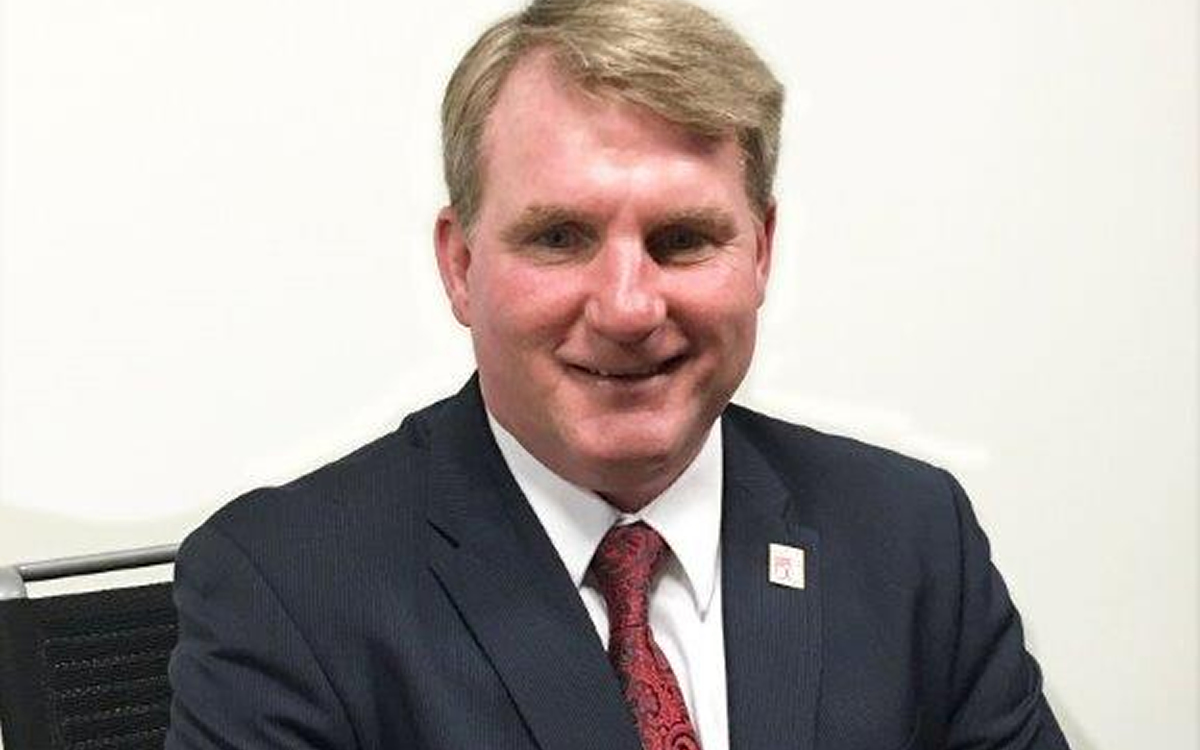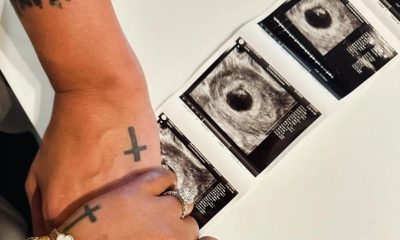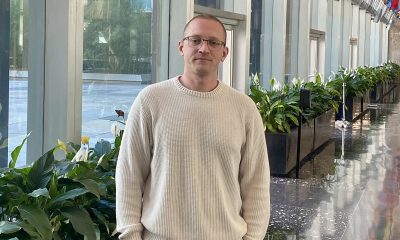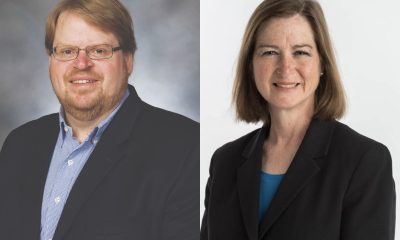News
Dutch diplomat attacked in Moscow
LGBT acronym scrawled onto mirror inside Otto Elderenbosch’s apartment

Two men attacked a Dutch diplomat in his Moscow apartment on Oct. 15. (By David Crawshaw via Wikimedia Commons.)
The Moscow Times cited a Russian newspaper that reported Onno Elderenbosch, who is the deputy chief of mission at the Dutch embassy in Moscow, saw an elevator in his apartment building was not working when he returned home. The publication said Elderenbosch saw two men dressed as electricians when he walked up to his apartment.
The Moscow News cited a Russian law enforcement official who said the two men beat Elderenbosch and ransacked his apartment once he opened the door. The newspaper said the source indicated Elderenbosch’s assailants also drew a heart with an arrow throughout it and the LGBT acronym in lipstick on a mirror inside the diplomat’s home.
Dutch Foreign Minister Frans Timmermans wrote on his Facebook page on Tuesday that Elderenbosch, whom he did not identify by name, was “slightly injured” during the attack. He said he had summoned Russia’s ambassador to the Netherlands to The Hague over the incident.
“Our people must be able to work safely,” Timmermans said. “I want assurances that the Russian authorities will uphold their responsibilities on that point.”
The Associated Press reported that a Russian Foreign Ministry spokesperson described the attack as a “deplorable incident.” He said authorities would continue to seek those responsible.
The attack against Elderenbosch took place against the backdrop of growing tension between the Dutch and Russian governments over the Kremlin’s LGBT rights record and a host of other issues.
COC Nederland, a Dutch LGBT rights organization, in April staged a protest outside a meeting between Russian President Vladimir Putin and Dutch Prime Minister Mark Rutte that coincided with the 400th anniversary of friendship between the two countries. Amsterdam Mayor Eberhard van der Laan refused to meet with Putin during his trip.
Russian authorities in July arrested four Dutch LGBT rights advocates under a law that bans gay propaganda to minors. More than 3,000 people protested the statute and other anti-LGBT measures in the country during a Kremlin-sponsored concert in Amsterdam.
COC Nederland has also criticized the International Olympic Committee over its response to the gay propaganda law and the country’s LGBT rights record ahead of the 2014 Winter Olympics that will take place in Sochi, Russia, in February. The group has also urged Dutch King Willem-Alexander and Queen Maxima to raise the aforementioned issues on their upcoming trip to Russia next month during which they are scheduled to meet with Putin.
Rutte, who has publicly criticized the Kremlin over its LGBT rights record, described the attack against Elderenbosch as “extremely serious” as the AP reported. The news agency noted he said “we need to get the facts on the table” first.
A Dutch Foreign Ministry spokesperson did not return the Washington Blade’s request for comment on the attack against Elderenbosch and whether he is gay.
COC Nederland Chair Tanja Ineke described the incident as “scandalous.”
“The police must get to the bottom of this,” she said. “It is terrible for the person involved and it appears to be another expression of the rapidly deteriorating climate for LGBT people in Russia.”
Politics
Smithsonian staff concerned about future of LGBTQ programming amid GOP scrutiny
Secretary Lonnie Bunch says ‘LGBTQ+ content is welcome’

Staff at the Smithsonian Institution are concerned about the future of LGBTQ programming as several events featuring a drag performer were cancelled or postponed following scrutiny by House Republicans, according to emails reviewed by the Washington Post.
In December, Secretary Lonnie G. Bunch III appeared before a hearing led by GOP members of the Committee on House Administration, who flagged concerns about the Smithsonian’s involvement in “the Left’s indoctrination of our children.”
Under questioning from U.S. Rep. Stephanie Bice (R-Okla.), Bunch said he was “surprised” to learn the Smithsonian had hosted six drag events over the past three years, telling the lawmakers “It’s not appropriate to expose children” to these performances.
Collaborations with drag artist Pattie Gonia in December, January, and March were subsequently postponed or cancelled, the Post reported on Saturday, adding that a Smithsonian spokesperson blamed “budgetary constraints and other resource issues” and the museums are still developing programming for Pride month in June.
“I, along with all senior leaders, take seriously the concerns expressed by staff and will continue to do so,” Bunch said in a statement to the paper. “As we have reiterated, LGBTQ+ content is welcome at the Smithsonian.”
The secretary sent an email on Friday expressing plans to meet with leaders of the Smithsonian Pride Alliance, one of the two groups that detailed their concerns to him following December’s hearing.
Bunch told the Pride Alliance in January that with his response to Bice’s question, his intention was to “immediately stress that the Smithsonian does not expose children to inappropriate content.”
“A hearing setting does not give you ample time to expand,” he said, adding that with more time he would have spoken “more broadly about the merits and goals of our programming and content development and how we equip parents to make choices about what content their children experience.”
Africa
Upcoming Ugandan Census will not count intersex people
Advocacy group report documents rampant discrimination, marginalization

Uganda’s national Census next month will not count intersex people.
The revelation about the exclusion of intersex Ugandans in the 9-day Census exercise that will begin on May 10 has been confirmed to the Washington Blade by the head of Uganda’s Bureau of Statistics.
UBOS Executive Director Chris Mukiza in response to the Blade’s questions on the issue said the agency has “no business with intersex.”
Their counting could have made Uganda the second African country and the third globally after Australia and Kenya to collect an intersex person’s data in a Census.
Kenya’s 2019 Census determined there were more than 1,500 intersex people in the country.
Uganda had a population of 34.8 million, according to the country’s last Census that took place in 2014.
Intersex people in Uganda are among marginalized groups, subject to stigma and discrimination. The government has yet to recognize them as the third sex and consider them among other minority groups, such as people with disabilities, who enjoy special treatment.
Intersex people cannot be exclusively categorized as male or female for having a biological congenital condition with unique sex characteristics due to inherent and mixed anatomical, hormonal, gonadal, or chromosomal patterns that could be apparent before, at birth, in childhood, puberty, or adulthood.
Mukiza’s position of excluding intersex people in the Census, however, comes amid the prime minister’s office’s demands for inclusivity and equality for all the population. (The Constitutional Court on April 3 refused to “nullify the Anti-Homosexuality Act in its totality.”)
“We recognize that much work remains to be done particularly in addressing the needs of the marginalized and vulnerable communities, promoting inclusive economic growth, and combating climate change,” said Dunstan Balaba, the permanent secretary in the prime minister’s office.
Balaba spoke on April 18 during the National Population and Housing Census prayer breakfast meeting the UBOS convened. Religious leaders and other stakeholders attended it.
President Yoweri Museveni has noted that data from the country’s sixth national Census will be crucial towards achieving the nation’s Vision 2040 and help the government, non-governmental organizations, and donors in providing services to the diverse population.
“It will also provide the basis for planning the provision of social services such as education, health, and transport, among others at the national and local level,” Museveni said as he urged citizens to fully support the Census and provide accurate information.
Uganda has an intersex rights organization, “Support Initiative for People with Atypical Sex Development (SIPD),” which activist Julius Kaggwa founded in 2008 with the support of groups that advocate for children, women, and other marginalized populations.
Some of SIPD’s work as a non-profit, grassroots organization includes community outreach and engagement, sharing reliable information with the society for the protection of intersex people’s rights, and championing the need for organized medical and psychological support.
The organization, through its numerous reports, has decried human rights violations against intersex people that include surgery without consent, discrimination in homes, schools and medical centers, parents abandoning intersex children, and stigma due to lack of legal protection by the government.
Uganda’s Registration of Births and Deaths Act allows a parent or guardian of a child under the age of 21 to change the name or sex at the local registration office. The SIPD, however, maintains this law is discriminatory to intersex people over 21 who want to change their sex characteristics, and want parliament to repeal it.
The intersex rights organization wants the Health Ministry to establish a central registry to register intersex children after they’re born in order to receive support in terms of healthcare, social and legal by the government and other stakeholders as they grow up.
SIPD particularly wants the government to enact a policy that would allow a gender-neutral marker on birth certificates for intersex children to ease any change of sex in the future. The organization also wants the government, through the Education Ministry, to adopt a curriculum that also considers intersex issues in schools and creates a friendly environment for intersex children to learn and graduate like their non-intersex peers.
These demands follow SIPD’s findings that disclosed many intersex children were dropping out of school because of the stigma and discrimination they suffered. The organization has further called on the public-funded Uganda Human Rights Commission to live up to its constitutional mandates of defending human rights by leading the promotion and protection of the rights of intersex people across the country.
SIPD has also challenged religious leaders, who play a key role in Ugandan society and are influential at the local and national level, to promote acceptance of intersex people and to end discrimination against them.
District of Columbia
Three of five LGBTQ candidates win race for DNC delegate from D.C.
32 candidates competed for 13 elected seats in party caucus

Three out of five known LGBTQ candidates running for election as delegates from D.C. to the Democratic National Convention won their races at an April 20 Democratic Party caucus election held at D.C.’s Walter Washington Convention Center.
Ward 2 gay Democratic activist John Fanning finished in first place with 140 votes and Ward 8 gay Democratic activist David Meadows finished in second place with 127 votes in a race in which six male candidates committed to supporting President Biden were competing for three male seats in a section of the city designated as Congressional District 1, which included registered Democratic voters in Wards 1, 2, 6, and 8.
Ward 7 gay Democratic activist Jimmie Williams won his race, finishing in third place with 200 votes in a race in which eight male candidates committed to President Biden competed for four male seats in the Congressional District 2 section of the city that included Wards 3, 4, 5, and 7.
Gay Democratic activist Felipe Afanador lost his race, finishing in sixth place with 47 votes in the Congressional District 2 election for male candidates backing Biden. It couldn’t immediately be determined which of the four wards in District 2 he is from.
The Washington Blade didn’t learn about Afanador’s status as an LGBTQ candidate until the Capital Stonewall Democrats announced it one day before the April 20 party election in an email statement.
In the Congressional District 2 race among female candidates, in which eight candidates competed for three female seats, transgender rights advocate and Ward 3 Democratic Party activist Monika Nemeth lost her race, finishing in sixth place with 49 votes.
The five LGBTQ candidates were among 32 candidates competing for just 13 elected delegate positions in D.C. D.C. will have a total of 51 delegates to the Democratic Convention, but the other 38 include elected officials and party leaders who are considered “automatic” or appointed delegates. The Democratic Convention will be held in Chicago Aug. 19-23.
Observers familiar with the April 20 party caucus election said Fanning, Meadows, and Williams had participated in local D.C. Democratic Party events and activities for a longer period than Nemeth and Afanador and appear to have been better known among Democratic voters in their respective wards as well as other wards. Those factors contributed to their receiving significantly more votes than most other candidates, observers have said.
In his candidacy statement posted on the D.C. Democratic Party website, Afanador said he worked on the 2020 Biden presidential election campaign in Pennsylvania. His LinkedIn page says in 2022 he began work in Washington for the Biden administration as an official in the U.S. Department of Agriculture.
Nemeth is a past president of D.C.’s Capital Stonewall Democrats, the city’s largest LGBTQ local political group, and has been an active member of the D.C. Democratic State Committee, the local party governing body. She served as a Biden delegate at the 2020 Democratic National Convention.
“It is important for our D.C. delegation to have strong LGBTQ representation,” Capital Stonewall Democrats said in its April 19 statement. “There are five LGBQ candidates running to be delegate, and Capital Stonewall Democrats asks that our members support each one,” the statement says.
“Unfortunately, they fell short, but they and all queer Democrats are welcome to attend and participate in convention events and activities sponsored by the national and local party,” Meadows told the Blade in referring to Nemeth and Afanador. “Our shared goal is to unite behind the Biden-Harris ticket to protect our LGBTQ rights from being dismantled by Donald Trump and the GOP,” Meadows said.
“Running for District Delegate is one of the most grassroots efforts,” Fanning told the Blade. “It’s very beneficial to align yourself on a slate with community leaders that have either previously run for District Delegate or have developed a constituency in their community from other civic engagements,” he said, referring to possible reasons for his, Meadows, and Williams’s election victory.
Aside from the D.C. elected LGBTQ delegates, two prominent D.C. LGBTQ Democratic leaders will be appointed as delegates to the 2024 Democratic National Convention in their role as members of the Democratic National Committee from D.C. They are Claire Lucas, a highly acclaimed Democratic Party and LGBTQ rights advocate and party fundraiser; and Earl Fowlkes, one of the lead organizers of D.C.’s annual Black LGBTQ Pride celebration and former president of the Capital Stonewall Democrats. Both are committed to supporting President Biden as the Democratic nominee for re-election.
-

 District of Columbia5 days ago
District of Columbia5 days agoNew D.C. LGBTQ+ bar Crush set to open April 19
-

 District of Columbia5 days ago
District of Columbia5 days agoReenactment of first gay rights picket at White House draws interest of tourists
-

 South America3 days ago
South America3 days agoDaniel Zamudio murderer’s parole request denied
-

 Opinions5 days ago
Opinions5 days agoOpen or closed? No, not your bar tab












